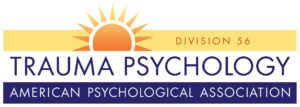Teaching Resources
Please see our general tips for educating students about trauma, as well as various undergraduate, graduate, and seminar syllabi below. In addition, there is an extensive collection of training videos that may be helpful teaching tools for you classroom.
Graduate/Undergraduate Syllabi
Graduate Class Syllabi
Special Topics: Working with Trauma in Clinical Practice
Trauma-Focused Approaches to Intervention
Advanced Trauma-Focused Approaches to Intervention
Assessment and Treatment of Trauma
Clinical Case Seminar in Trauma Studies: Transdisciplinary Reappraisals of Clinical Work
Trauma: Theoretical and Clinical Perspectives
Crisis and Disaster Interventions
TeachTrauma
Bethany Brand's TeachTrauma site contains a variety of course syllabi and other helpful information on teaching trauma in an academic setting.
Education Video Collection
The Center for the Treatment of Developmental Trauma Disorders, a treatment and services adaptation center in the National Child Traumatic Stress Network has developed a library of 50+ films of therapy sessions and dialogues amongst therapists, youth, and caregivers that are designed for pre-professional and professional education by bringing to life the experience of doing trauma-focused psychogherapy with children, youth, and young adults who are courageously recovering from complex trauma — and also dealing with ongoing adversity and complex trauma — and their adult caregivers. The films feature more than 25 outstanding therapists from diverse personal backgrounds and professional orientations, who are meeting in real-time with clients in crisis. The clients are portrayed by actors to protect privacy and safety, but the sessions and the commentaries/dialogues afterward are spontaneous and real. We invite educators, trainers, and professionals in practice and in training to view these films at no cost — and to utilize them in trainings and classes -- by going to the CTDTD website (above) or the Critical Moments and Healing Developmental Trauma pages in the Clinical Resources section of the NCTSN Learning Center.
Guidelines on Trauma Competencies for Education and Training
The scientific literature on trauma is large and growing. However most mental health professionals only have a cursory knowledge of this science (Courtois & Gold, 2009) . In addition, they have no formal training in nor apply evidence-based psychosocial treatments for trauma-related disorders (Cook, Dinnen, Rehman, Bufka, & Courtois, 2011; Gray, Elhai & Schmidt, 2007 ).
A national consensus conference was held at Yale University in New Haven, Connecticut in April 2013 to develop a comprehensive model of trauma-focused, empirically-informed competencies—knowledge, skills, and attitudes that professionals should aspire to have when working with traumatized children and adults (Cook, Newman, & the New Haven Trauma Competency Group, 2014).
APA has now officially approved the model, deemed the New Haven competencies, as the Guidelines on Trauma Competencies for Education and Training. They can provide the basis for training a trauma-informed mental health workforce.
Textbooks Grades
Coverage of Childhood Maltreatment
A recent study by Cindy Miller-Perrin of Pepperdine University found that textbooks used in teaching Introductory Psychology courses often lack information about the prevalence and impact of child maltreatment, despite the well-documented and often long-term negative impact that maltreatment has on children (Kissee, Isaacson, & Miller-Perrin, 2014). Even more concerning, some textbooks presented one sided reviews of controversial topics such as delayed recall of childhood trauma and dissociative disorders. Bethany Brand and her research team at Towson University recently collaborated with Cindy Miller-Perrin to assess the accuracy and adequacy of the information about child maltreatment and its link to psychopathology in Abnormal Psychology textbook. Their results echo those of earlier studies: some textbooks still present one-sided, sensationalized, and even inaccurate information related to child maltreatment (Wilgus, Packer, Lile-King, Miller-Perrin & Brand, 2015). The results of these studies will impact professors' textbook selections as well as prompt textbook authors to provide balanced and evidence-based information about trauma in their textbooks.
Based on this important work, Division 56 bestowed the "Best Coverage of Child Maltreatment in Undergraduate Psychology Textbooks Award to Nevid, J., Rathus, S., & Greene, B. (2014). Abnormal Psychology in a Changing World. (9th ed.). Upper Saddle River, NJ: Pearson Education, Inc. due to its outstanding coverage of traumatic disorders linked to child maltreatment.
Dr. Nevid stated the following in response to the award:
"I am deeply honored to have earned this award. I received the notification today and downloaded your article, which was very thorough and extremely helpful I am especially thankful for the suggestions in the article about the additional mentions to improve coverage of CM issues. Though space is always at a premium in texts, I intend to expand our coverage to include additional content. Thank you again for this very distinguished honor."
Division 56’s Education and Training Committee has compiled a list of graduate academic programs that currently offer training in trauma or have faculty who specialize in trauma. If you know of additional programs or faculty that should be included, please contact the Chair of the Committee to have them added to the list. We would like to extend our appreciation to the Committee members Janna Henning, Psy.D., FT, Jessica Jensen, Psy.D., Christianna Flynn, M.S., M.A., and Sydney Rae Appelbaum, M.A. for their hard work in compiling this list.
Please see our guide for doctoral and internship training programs with a trauma focus.
Please see our interactive map below for doctoral and internship program locations.
